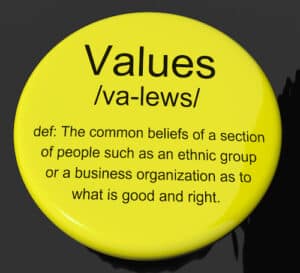Okay we’ve all heard the little idioms, like “perception is reality to those who perceive,” or even just “perception is reality.” My personal favorite is “my perception is my reality.”
What the hell does all that mean? Well for you, leaders, it means that how people perceive your leadership is infinitely more important than what you intend for your leadership to be. It means that what you say means little, compared to the actions that you take (or words that you write).

Actual ethics violations aren’t the problem — it’s the perception of ethics violations. Let that sink in for a bit. In leadership, we all too frequently feel that an ethics breach means we’ve done something affirmatively.
For instance, we accepted a gift from a supplier, then because of that gift we renew that supplier’s contract for another year. No brainer, right? Hold on a minute, Mr. Gekko; that’s incorrect, from an employee’s view. The ethics violation occurred when you accepted the gift… period. Even had you cancelled the supplier’s contract, the gift acceptance was your ethics breach.
You see, it’s the appearance of conflict that causes ethics concerns, not the actual dastardly deed.
It doesn’t matter if you care, they must see that you care. This comes up a lot with coaching clients, when presented with 360-degree feedback that suggests that they “don’t care about us.” “But I really do care,” they say, and proceed to rattle off some specifics that either support their assertion or explain why they couldn’t do something.
It’s not enough to care—people have to know that you care. Telling friends and colleagues that you love your spouse or significant other doesn’t mean much if you aren’t saying that same thing to your actual spouse or significant other. Checking with HR to see if you can help an employee with a bereavement leave issue is good; actually speaking with that employee about the reason for the leave and what you can do to help is better.
It’s not enough to care—you’ve got to show that you care.
Finally, values aren’t values if you don’t value them. No, I’m not trying to be funny with the wording. In fact, it might actually be funny, if it weren’t so damned true. Just because we say we value something doesn’t mean we actually do, nor does it mean that others will internalize it themselves. News flash—employees know very well what you value, regardless of what you say (and don’t get me started on those wall-plaques).

You know how you tell what you value? Easy—where do you spend your time?
- If you claim to value people, yet 60% of your calendar is financial-based appointments,
- If you speak of our “family” environment, but never seem to make it to the sponsored ball games, or
- If you promote “respect” as a value, but are regularly late to meetings, or allow interruptions…
…you’re simply confused about what “values” really are.
We try. I know we really do try. But here’s the cold reality: it’s not good enough to try… not in leadership. You’ve got to succeed in molding perceptions that reflect your known reality. Perceptions really do matter—in fact, for most purposes, they’re all that matters. Your beliefs or intentions just aren’t part of that equation.
Allow others to see what you’re really meaning, what you really want, and what you really value. Help their perceptions mirror up to your reality.
Make your intentions more… intentional.

